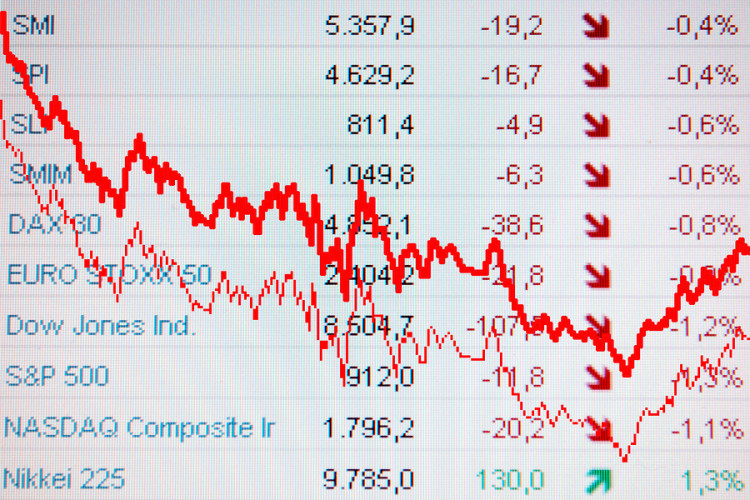U.S. Stocks Continue Selloff as Brexit Angst Weighs on Sentiment

Banks remained the focal point in the downdraft, with no sign of the pummeling letting up as lenders marked the worst two-day drop in almost five years. Bank of America Corp. and JPMorgan Chase & Co. sank more than 3.3 percent. Raw-material and industrial shares also posted the steepest back-to-back slide since 2011. Sentiment was dealt another blow after S&P Global Ratings today cut the U.K.’s top credit grade by two levels.
The S&P 500 Index dropped 1.8 percent to 2,000.54 as of 4 p.m. in New York, holding at the lowest since March 10. The benchmark fell below its average prices during the past 100 and 200 days. The Dow Jones Industrial Average lost 260.51 points, or 1.5 percent, to 17,140.24, after falling more than 600 points Friday. The Nasdaq Composite Index decreased 2.4 percent to an almost four-month low. About 10.6 billion shares traded hands on U.S. exchanges, 48 percent above the three-month average.
“Today seems to be a repeat of Friday,” said Ben Rozin, senior analyst and portfolio manager at Manning & Napier Advisors, which manages $37.3 billion. “We came into this year with first-quarter earnings being weak, and we were just beginning to see signs that the second quarter would be better. A big shock isn’t good for confidence or investments. There’s a lot of uncertainty and people weren’t positioned for the vote ahead of time.”
More than $974 billion has been erased from S&P 500 stock values in the past two days, the third-most in history, according to data compiled by S&P Dow Jones Indices. The biggest loss of value came in August, when $1.3 trillion was wiped out following China’s shock currency devaluation.
Risk assets have been under pressure since Britons voted to secede from the EU, raising concerns that an already-fragile global economic recovery will falter as trade snarls in one of the world’s biggest consumer blocs. Friday’s losses reversed a weekly advance in the S&P 500 and pushed the CBOE Volatility Index up 49 percent. The measure of market turmoil known as the VIX fell 7.4 percent Monday to 23.85, even as stocks continued to drop.
The U.K.’s Brexit vote left investors around the world scurrying toward safe havens for a second session after the S&P 500 on Friday fell 3.6 percent to erase its advance for the year. Investors are watching for policy action by central banks worldwide to ease the turmoil and pump liquidity into financial markets. European equities continued to bear the brunt of the selling, with the Stoxx Europe 600 Index losing 4.1 percent to its lowest since February.
“It’s been a very volatile market which we somewhat expected,” said Barbara Reinhard, head of asset allocation for multi-asset strategies at Voya Investment Management, which manages $213 billion. “This is the new normal — politics could add more volatility to all financial assets. This is in part because central banks have done the lion’s share of lifting for stimulus.”
The next days and weeks will likely be key for central banks as they seek to minimize the damage in trading from Asia to the U.S. European equities extended losses on Monday, even as U.K. Chancellor of the Exchequer George Osborne sought to reassure financial markets, saying contingency plans were in place to shore up the U.K. economy.
Orderly Reaction
Financial leaders including International Monetary Fund Managing Director Christine Lagarde and U.S. Treasury Secretary Jacob J. Lew have said that the market reaction to Brexit had been orderly so far and that central banks have worked effectively to protect liquidity in the system.
Traders abandoned bets on future Fed interest-rate increases well into 2017, after expectations for higher borrowing costs this year had crept up before the Brexit vote. Odds of a Fed move by February have fallen to 9 percent, from 52 percent Thursday. The probability of a rate cut when policy makers meet in September rose to 23 percent.
Britain’s departure will unleash as much as $300 billion of selling by automated quant programs in the already-battered U.S. stock market, Marko Kolanovic, the JPMorgan Chase & Co. derivatives strategist, wrote in a note late Friday. Equity investors in the U.S. would be wise to stay away until quant managers finish the rebalancing that was forced on them by the day’s volatility, he said.
“Economically sensitive industries — industrials, energy, materials, financials — are all taking the biggest hits, and that makes perfect sense,” said Peter Jankovskis, who helps oversee $1.9 billion as co-chief investment officer of Lisle, Illinois-based OakBrook Investments. “There is still some order. You’re seeing strength in utilities and telecoms, so there definitely is the flight to safety and risk-off nature.”
Seeking Safety
In Monday’s trading, eight of the S&P 500’s 10 main industries fell, with raw materials, energy and financial shares sinking at least 2.5 percent. Utilities rose 1.3 percent to an all-time high and phone companies added 0.6 percent as investors sought refuge in the year’s two best-performing groups.
Banks in the benchmark index capped the steepest back-to-back slide since 2011, when lenders plunged amid Europe’s sovereign debt crisis and a downgrade of the U.S.’s credit rating. Fifth Third Bancorp dropped 7.1 percent, and Citigroup Inc. lost 4.5 percent to a four-month low. The KBW Bank Index slumped 5.1 percent to bring its two-day retreat to 12 percent.
Lazard Ltd. and Evercore Partners Inc. posted their biggest two-day declines since at least 2008, leading a slump of independent investment banks. Moelis & Co. and Greenhill & Co. sank at least 7.7 percent today to their lowest levels ever.
Concerns that Britain’s EU exit will exacerbate an already weak global growth outlook dragged down raw-materials producers. Glass container maker Owens-Illinois Inc. tumbled 9.1 percent, bringing its decline since Thursday’s close to nearly 18 percent, the largest two-day selloff since 2009. Dow Chemical Co. and Freeport-McMoRan Inc. lost at least 3.1 percent Monday.
Brexit aftershocks battered airlines, with a Bloomberg index of U.S. carriers dropping to its lowest since October 2014. Delta Air Lines Inc. was the biggest drag on the gauge, losing 5.2 percent, while American Airlines Group Inc. and United Continental Holdings Inc. fell at least 6.5 percent to 2 1/2-year lows.
Auto-parts maker BorgWarner Inc. posted its biggest two-day drop ever, losing 18 percent amid concerns about European auto production, the stronger dollar and U.K. sales. Ford Motor Co. and General Motors Co. lost more than 2.8 percent.
Energy producers slid for a second day as West Texas Intermediate crude futures in New York fell 2.7 percent. Schlumberger Ltd. had its steepest back-to-back slide in 10 months, while ConocoPhillips lost 5.5 percent, its third drop in four sessions to the lowest since April 7.
Microsoft Corp. retreated 2.8 percent to pace declines in the technology group. Shares of the software giant went from briefly touching a 16-year high in April to an eight-month low today, a 14 percent slide with about half of it coming in the last two sessions. Facebook Inc. slumped 2.8 percent to its lowest in two months. Western Digital Corp. fell almost 12 percent, bringing its two-session selloff to 17 percent, the most since 2008.
–With assistance from Joseph Ciolli, Anna-Louise Jackson, Anna Kitanaka, Tom Redmond and Carolynn Look. To contact the reporters on this story: Dani Burger in New York at dburger7@bloomberg.net ;Bailey Lipschultz in New York at blipschultz@bloomberg.net To contact the editors responsible for this story: Cecile Vannucci at cvannucci1@bloomberg.net John Shipman, Namitha Jagadeesh
copyright
© 2016 Bloomberg L.P







No Comment